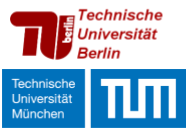Department of Civil Systems Engineering, TU Berlin
Complex networks of infrastructure and building systems form the backbone of the social and economic life of the 21st century. Urban life as we know it would not be possible without transportation networks, waterway networks, pipelines, electrical grids, hospitals, or airports. Additionally, modern dwellings and office buildings form socio-technical systems with many different natural, physical, social, and cyber-physical elements that stand in complex interaction with each other. Because of the interactions between all these different natural, physical, social and cyber-physical elements, engineering, constructing, and maintaining these infrastructure and building networks becomes an increasingly difficult task requiring advanced intelligent computing methods. In response to this challenge, the chair for Systems Engineering offers an education and research program that explores such computing methods and techniques to model complex systems to support all aspects of their agile and informed design and engineering. To this end, a specific focus lies on stochastic modelling of multi-physical system processes, the parametric modelling of system components, and the support of multi-disciplinary integrated collaborative engineering work.
Chair of Computational Modeling and Simulation, TU Munich
The Chair of Computational Modeling and Simulation is part of the Department of Civil, Geo and Environmental Engineering, the Leonhard Obermeyer Center of Digital Methods for the Built Environment, and the Munich School of Engineering. Our teaching and research focus lies on computer-based development of engineering products, in particular on the planning and realization of facilities using computational modeling and simulation tools.
Our current research work ranges from establishing Building Information Modeling methods over the spatio-temporal analysis of 4D models and the computer-supported life-cycle management of buildings to the simulation of construction processes and pedestrian dynamics. In all our projects we are closely collaborating with industry partners and scientists from other research disciplines.
EG-ICE
EG-ICE is the acronym for the European Group for Intelligent Computing in Engineering. The primary goals of the group are to promote advanced informatics research across Europe by improving contact between researchers, fostering research collaboration and enhancing awareness of the latest developments. With this latter aim in mind, the group maintains active contact with similar groups in countries outside Europe and encourages membership of non-Europeans. The group has a further aim to increase the awareness of industry of advanced informatics as well as the economic benefits that can be gained by implementation. To achieve its aims, the group runs a yearly workshop and is active in the promotion, dissemination and exchange of ideas in order to provide effective links between research, industry and teaching.
The University
The internationally renowned Technische Universität Berlin is located in Germany’s capital city at the heart of Europe. Our academic activities are focused on achieving sharply-defined goals: building a distinctive profile for our university, ensuring exceptional performance in research and teaching, providing our graduates with excellent qualifications and a modern approach to university administration. The TU Berlin strives to promote the dissemination of knowledge and to facilitate technological progress through adherence to the core principles of excellence and quality. Strong regional, national and international networking with partners in science and industry are an important aspect in these endeavors.
